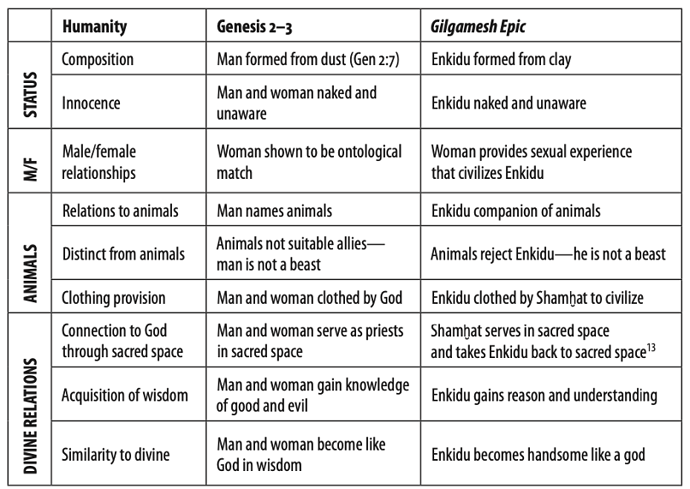Walton drops the ball big time with Adam and Eve though. I just read part of one of his works today where he said, “Adam and Eve are the first significant humans.” [emphasis his] I think I even read somewhere where he said their names weren’t Adam and Eve either. I couldn’t imagine exegesis any more haphazard or bizarre. His work on Genesis goes from excellent to academic embarrassment in a nano-second.
This image is from one of his books. He clearly knows a million time more about the historical backdrop of Genesis than I do. He must really be convinced by the necessity of a historical Adam from genealogies and arguments made in the NT.
God’s creative week is told in a functional pattern and technically the seventh day never ended. It’s not 24 hours. Jesus referred to the ongoing rest in John. The earth is the Lord’s temple.
Also I just made this thread:
On that page in section three I have the following in regards to your passage:
[1] If we must take the days of creation as completely literal what are we then to make of Exod. 31:16–17: “ 16 Therefore the Israelites shall keep the sabbath, observing the sabbath throughout their generations, as a perpetual covenant. 17 It is a sign forever between me and the people of Israel that in six days the Lord made heaven and earth, and on the seventh day he rested, and was refreshed .” Does god really need to rest? Must we literally believe that our omnipotent creator grew tired after creating things? Miller and Soden write:
“The verb “refreshed” is used three times in the Scriptures, including Exodus 23:12 (“Six days you shall do your work, but on the seventh day you shall rest; that your ox and your donkey may have rest, and the son of your servant woman, and the alien, may be refreshed”) and 2 Samuel 16:14 (“And the king, and all the people who were with him, arrived weary at the Jordan. And there he refreshed himself”). The latter verse makes it clear that it is weariness that requires refreshment. But was God literally weary? Had he become spent during the week of creation? No, but he was describing his figurative workweek in a way that corresponded with human experience, so that mankind would also rest even as God had “rested.” God is drawing an analogy here rather than an equation. If we do not understand God’s “rest” and “refreshment” to be the same as man’s, should we expect God’s “days” to be the same?”[1]
The framing of the creation week appears theological as it partly establishes the reasoning for the Sabbath. Caution is warranted by this in how literally we take some of the details of creation.
I mean, would you say our omnipotent creator literally needed to be refreshed? The Bible says it so it must be so?
Vinnie
